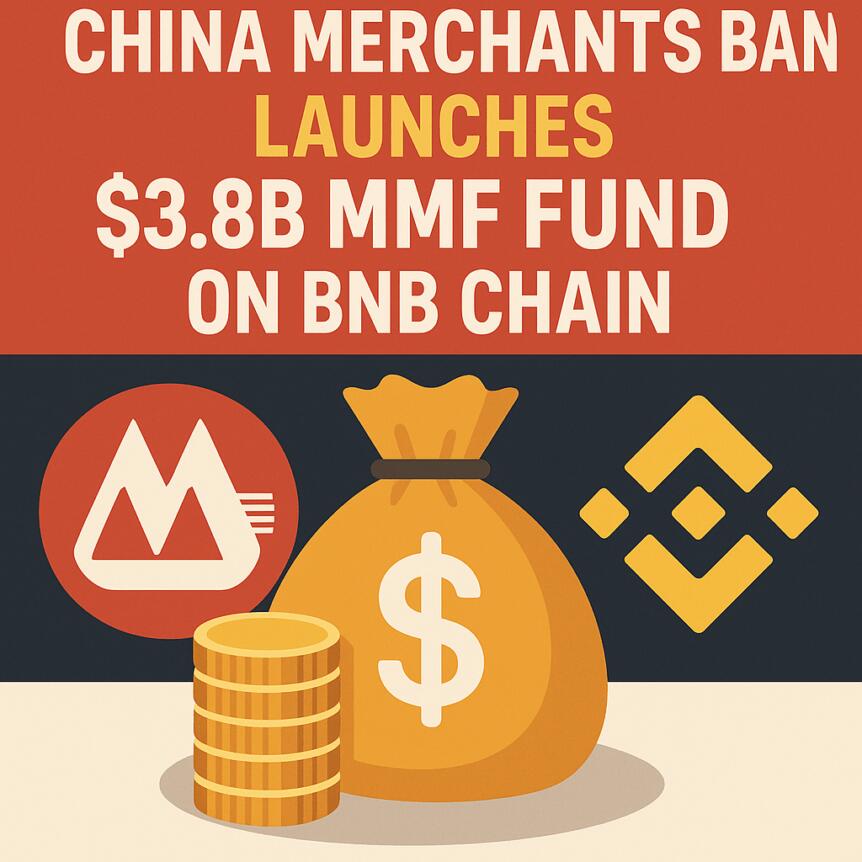Market Pulse
In a significant development that bridges the chasm between traditional finance (TradFi) and the burgeoning blockchain ecosystem, China Merchants Bank International (CMBI) has successfully tokenized a substantial $3.8 billion Money Market Fund (MMF) on the BNB Chain. This move marks a pivotal moment for institutional adoption of blockchain technology, showcasing a growing confidence in distributed ledger technology to manage and enhance conventional financial products. The initiative underscores the accelerating trend of real-world asset (RWA) tokenization and solidifies the BNB Chain’s position as a viable platform for large-scale financial applications.
A Landmark for Traditional Finance and Blockchain Integration
CMBI, the Hong Kong-based investment banking arm of the prominent China Merchants Bank, has taken a bold step by migrating a significant portion of its MMF into a tokenized format. This isn’t merely a pilot project; it represents a substantial commitment, with the fund valued at approximately $3.8 billion. The decision by such a major financial institution to leverage a public blockchain like the BNB Chain sends a powerful signal to the global financial community. It suggests a growing recognition of blockchain’s inherent benefits – including enhanced transparency, improved liquidity potential, and streamlined operational efficiencies – even for highly regulated and established financial instruments.
- Institutional Validation: CMBI’s move provides strong validation for blockchain technology as a robust infrastructure for sophisticated financial products.
- Scale and Scope: Tokenizing a fund of this magnitude ($3.8 billion) demonstrates that blockchain solutions are no longer confined to niche experiments but can handle significant capital.
- Hong Kong’s Role: This development further cements Hong Kong’s ambition to become a leading hub for digital assets and innovative financial services in Asia.
The Strategic Choice of the BNB Chain
The selection of the BNB Chain for this pioneering initiative is notable. Known for its high transaction throughput, relatively low fees, and a robust developer ecosystem, the BNB Chain offers an appealing environment for financial applications demanding efficiency and scalability. While not the first blockchain to host tokenized assets, its adoption by CMBI for such a high-value fund highlights its increasing credibility and technical capabilities. The partnership indicates a strategic alignment, where CMBI benefits from blockchain’s efficiencies, and the BNB Chain gains significant institutional endorsement and practical utility.
The integration potentially allows for:
- Faster settlement times for MMF units.
- Increased accessibility for a broader range of investors, subject to regulatory frameworks.
- Greater transparency in fund management and ownership records.
- Potential for innovative financial services built on top of the tokenized MMF.
The Expanding Horizon of Real-World Asset (RWA) Tokenization
CMBI’s tokenized MMF is a prime example of the accelerating trend of Real-World Asset (RWA) tokenization. This involves taking tangible or intangible assets from the traditional world – such as real estate, bonds, equities, commodities, or in this case, a money market fund – and representing their ownership or value on a blockchain. RWA tokenization aims to unlock liquidity, reduce intermediaries, enable fractional ownership, and enhance the transferability of assets. This move by CMBI suggests that traditional financial institutions are increasingly looking at blockchain not just for cryptocurrencies, but as a foundational technology to modernize and revolutionize their existing product offerings.
Implications for the Crypto Market
The news carries significant implications for the broader crypto market, and particularly for the BNB ecosystem. For the market at large, it serves as a powerful testament to blockchain’s enterprise-grade utility, potentially attracting more institutional capital and interest. For BNB, it bolsters the chain’s reputation as a secure and scalable infrastructure for financial services, which could lead to increased network activity and demand for its native token. While regulatory clarity remains a continuous journey, each major institutional adoption like this paves the way for greater acceptance and integration of blockchain within the global financial system.
Conclusion
The tokenization of a $3.8 billion Money Market Fund by China Merchants Bank International on the BNB Chain represents a significant milestone in the convergence of traditional finance and blockchain technology. It not only validates the practical utility of public blockchains for substantial financial instruments but also underscores the growing momentum behind real-world asset tokenization. As more major financial players explore and implement similar initiatives, this event could be seen as a harbinger of a future where digitized, blockchain-native financial products become increasingly commonplace, reshaping the landscape of global finance.
Pros (Bullish Points)
- Provides significant institutional validation for public blockchain technology and tokenized assets.
- Showcases a powerful real-world use case for the BNB Chain, potentially increasing its utility and demand.
- Accelerates the broader trend of Real-World Asset (RWA) tokenization, opening doors for more TradFi integration.
Cons (Bearish Points)
- Regulatory uncertainties surrounding tokenized financial products persist globally, posing potential hurdles for wider adoption.
- The direct impact on retail investors might be limited initially, as these products primarily target institutional or accredited investors.
- While a step towards decentralization, large institutional involvement can raise concerns about potential centralization of influence or control.
Frequently Asked Questions
What is a Money Market Fund (MMF)?
A Money Market Fund is a type of mutual fund that invests in high-quality, short-term debt instruments, aiming to provide liquidity and a stable income to investors, often considered a low-risk investment.
Why is tokenizing an MMF on a blockchain significant?
Tokenizing an MMF can enhance liquidity, reduce administrative costs, enable faster settlement, and potentially offer greater transparency and accessibility for investors through distributed ledger technology.
What does this development mean for the BNB Chain?
This move significantly bolsters the BNB Chain's credibility as a robust and scalable platform for institutional financial applications, potentially leading to increased network activity, developer interest, and overall utility for its native token.



